

Listen to 300+ interviews on philanthropy, sustainability and social entrepreneurship. Guests include Paul Polman, David Lynch, Siya Kolisi, Cherie Blair, Chiwetel Ejiofor, Bob Moritz, David Miliband and Julia Gillard. Hosted by Alberto Lidji, Visiting Professor at Strathclyde Business School and ex-Global CEO of the Novak Djokovic Foundation. Visit Lidji.org for more information.
Episodes

Monday Apr 22, 2019
Monday Apr 22, 2019
CEO of 100 Women in Finance, Amanda Pullinger, joins Alberto Lidji to talk about their invaluable peer network, educational initiatives and philanthropy.
In this episode, Amanda provides insight into the work of 100 Women in Finance and shares her thoughts and observations on the need to inspire young women and to improve the numbers of women who hold senior positions in the finance industry – particularly in investment roles.
Founded in 2001 (originally known as 100 Women in Hedge Funds), it is a global network of professionals in the finance and alternative investment industries working together to empower women at every stage of their careers. They have a focus on peer engagement, philanthropy and educational initiatives.
The organisation enjoys royal patronage from Prince William, The Duke of Cambridge, who first became patron of 100 Women UK Philanthropic Initiatives in 2009, and from The Duchess of Cambridge and Prince Harry who also became patrons in 2012.
More than $50 million have been raised by 100 Women in Finance events in support of philanthropy.
A key focus is 100 Women in Finance’s Next Generation initiative. Amanda notes that the percentage of women who are fund managers hasn’t really shifted for the past 20 years. There are many reasons for this but she realised there was a need to overcome some of the myths about the finance industry and some of the negative press the industry has received. Indeed, while some criticisms about the industry are well founded, much of the negativity is overstated and isn’t actually accurate.
An approach of 100 Women in Finance is to showcase successful women in the finance industry and, through the use of role models, get into schools, universities and business schools, so the next generation of young women can see that there are some fantastic opportunities in the industry.
Demystifying what the finance industry does is a critical factor for the next generation – the reality is very different from what one sees in films such as the Wolf of Wall Street. There is a need to change how young women perceive the finance industry and to make them aware they can actually make a positive impact by working in finance.
Irrespective of gender, attracting millennials to the finance industry requires much more than simply underscoring how intellectually interesting or lucrative this field can be. The next generation want to know they’re making a difference to everyday men and women, and underscoring the increasing prevalence and importance of impact investing, ESG-integrated investing and sustainable investing is important in this new context.
When asked how the inclusivity landscape has changed over the last five years, Amanda provided a very telling anecdote: this year she was invited to attend 8 events in London related to International Women’s Day (she was a speaker at 4 of them) and “it felt this year like it was International Women’s Day on steroids”.
Amanda feels we’re talking about the issues more but she’s not sure that we are actually doing as much as we can to provide solutions to the issues.
A lot of what’s happened over the last 5 years is that there have been the headlines and there have been the statistics and the focus on the data, but what’s interesting is that with all the studies that have come out saying that diverse teams produce better results – across industries and across sectors – the numbers still haven’t really changed.
She worries that people are going to get bored, thinking here we go again with the unconscious bias training; and her worry is that people will tire of the talk. Consequently, Amanda’s focus has been on finding solutions and exploring how to activate these solutions so the numbers really do change.
Full episode notes and additional resources are available at Lidji.org
No comments yet. Be the first to say something!